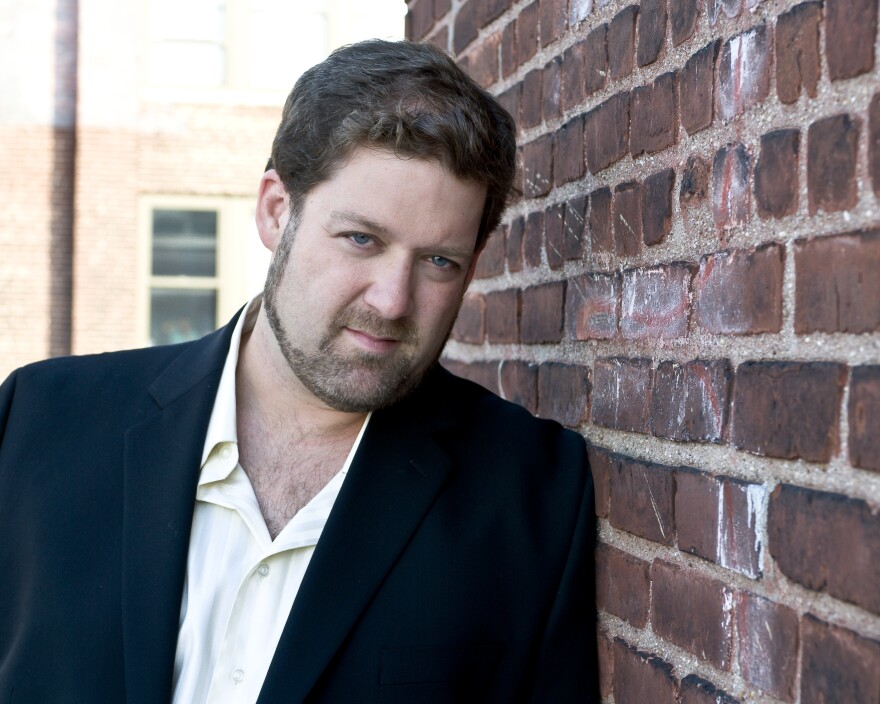Andrew Stuckey, in town to sing the title role in Verdi’s “Falstaff” with Winter Opera, stopped his car along Arsenal Street last week. The baritone grabbed his cell phone and snapped a selfie in front of a faded Falstaff beer ad.
Generations of St. Louis beer drinkers can recognize the fictional Sir John Falstaff. This weekend they can enjoy few laughs while learning more about how Verdi and Shakespeare saw him.
Falstaff
When: 8 p.m. Feb. 7 and 3 p.m. Feb. 9
Where: Skip Viragh Center for the Arts at Chaminade, 425 Lindbergh Blvd., Frontenac
Cost: $36-$51
Information: 314-865-0038
Stuckey said that small regional companies are important to keep the art form alive. "It is amazing what (Winter Opera) does with such a small staff. It’s fun to see a newer opera company grow,” Stuckey said. “This is going to be a good production, I think it could really be a great production.”
About the opera
In the early 1890s, the great Italian tragic opera composer Giuseppe Verdi reached to his shelf of Shakespeare’s plays (he’d already set “Macbeth” and “Otello” to glorious music) to write what became the final opera of his career.
Verdi, then 79 years old, and librettist Arrigo Boito combined chunks of the story of the younger Falstaff from the “Henry” history plays to the buffoon antics of the aging Falstaff in the comic “Merry Wives of Windsor.” In that comedy, Falstaff sends identical love letters to wives of two prosperous Windsor men. His motive isn’t love but the chance to get some of their money. The clever Windsor women scheme to trick the rogue.
“Verdi and Boito added depth to the character of Falstaff by bringing in sections like the honor monologue from ‘Henry IV, Part One’,” Stuckey said. The opera captures something of the baldfaced, brashness of the younger Falstaff in the history plays, he said. “In Shakespeare’s ‘Merry Wives of Windsor’ , Falstaff is more the pawn of the wives who are playing tricks on him.
“The opera is just deeper, than Shakespeare’s ‘Merry Wives of Windsor’ alone,” Stuckey, 43, said.
“With ‘Falstaff’ I really think that Verdi said something about aging -- that an old man is not just a buffoon. He must have felt that about himself. He had the energy to write this complex opera, as he neared 80.
“And Verdi kept revising (Falstaff) after it opened,” Stuckey said. It opened Feb. 9, 1893, at Milan’s La Scala Opera House. The next year Paris’ Opera-Comique and London’s Covent Garden gave productions.
“He kept working so, the first three productions were different,” Stuckey said.
This is the fourth time Stuckey is singing the role. “It is always an honor to sing Falstaff,” Stuckey said.
Comic Acrobatics
Stage director Anthony is finding enthusiasm from others at rehearsals.
“It’s my favorite opera,” Anthony said. “I think Verdi was getting better all the time.”
Of Verdi’s 27 operas only one did not end tragically. After “Otello,” Verdi wrote that he had done enough “massacres of my heroes and heroines” and wanted to write a comedy.

Anthony is getting the singers to play up the witty lines and action. He’s determined to follow the opera’s music pace, which moves the story at almost movie speed, he said.
The plot in which the Windsor widows get the best of Falstaff has modern appeal.
“The women always have the upper hand, even when things go awry. For (those) time periods (Shakespeare in the 1590s; Verdi in the 1890s) it was unusual that the women would win on stage,” he said. “That is a charming part of this show, a fascinating element.”
Anthony likes that Verdi’s music clearly defined each personality. Verdi mostly tells the story through conversation, or recitatives and that set this apart from most of his works with their grand arias, huge choruses and overwhelmingly beautiful finales. That foreshadows many 20th century operas that did not have big finales and fewer arias, Anthony said.
Anthony is working with what he called a strong, enthusiastic cast who are young and fit enough to be able to do comic body movement as well as singing.
The singers

Ron Loyd sings the role of Ford a wealthy Windsor burger, Kathy Pyeatt sings his wife Alice Ford. Katy Lindhart sings the Fords’ daughter Nanetta.

Kate Tombaugh sings Meg, Claudia Chapa sings Dame Quickly. Dustin Peterson sings Fenton.

Zachary Devin sings Dr. Caius. The two comic Falstaff followers are Marc Schapman as Bardolfo and Adam Stefo as Pistola.
Several of the singers are known to St. Louis opera buffs, Stefo is returning to Winter Opera. Tombaugh and Lindhart sang at Opera Theatre St. Louis. Devin and Schapman have sung at Union Avenue Opera.
Until seven years ago when Antony, now 50, moved from singing to directing operas, he sang the tenor role of Bardolfo about 50 times, he said.
The St. Louis native is making his St. Louis directing debut in this production, his second “Falstaff.” Last summer he directed it at Brevard Opera, in western North Carolina, where he is the company’s artistic director. He is also is director of Washington University’s opera studies department.
Anthony, who grew up in Creve Coeur and graduated from Parkway North in 1982, is often on the road to direct eight to 12 operas a year. In mid-January he was in Pensacola, Fla., directing “Carmen.”
Anthony has happy memories of studying after college at the old CASA (St. Louis Conservatory of Music) with voice teacher Edward Zambarra. He sang more than 100 different tenor roles before turning to directing.
Company music director Steven Jarvi, also the St. Louis Symphony resident conductor, will conduct the opera.



